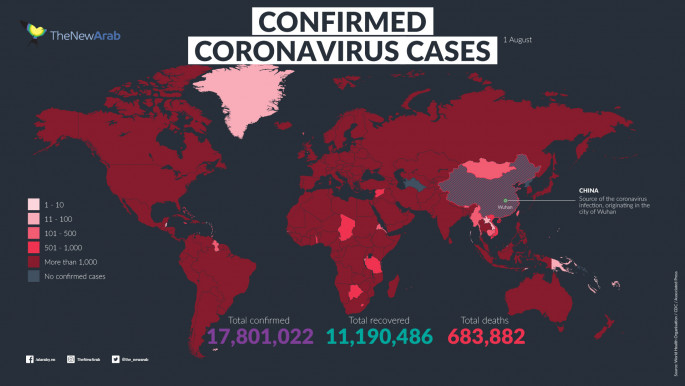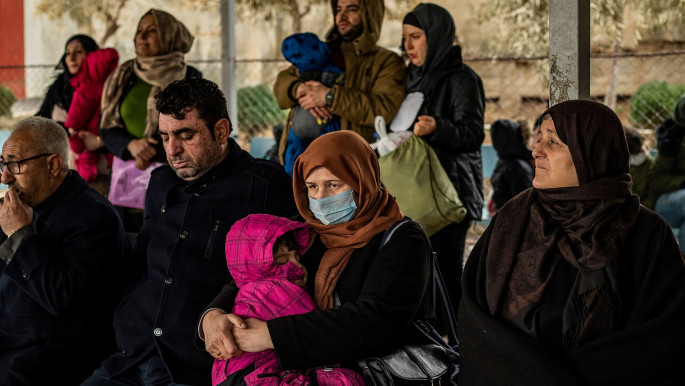Lebanon's medical students on the frontline in fighting coronavirus
The first case of coronavirus in Lebanon was confirmed on February 21 after a woman arrived on a plane to the Lebanese capital Beirut from Qom, Iran, where the number of patients who have tested positive for the virus has surpassed 6,000.
Atef Akoum is a medical student from the Lebanese University specialising in internal medicine and has been an intern at the hospital since April 2019. He was at RHUH when the first case was confirmed.
"A nurse came to our office and told us that we have a corona patient in the hospital," he recalled to The New Arab.
"We thought it was a joke. So we continued our rounds normally. After a few minutes, Dr Hassoun, who is in charge of corona patients, came to us and told us that we have a corona case who was has been in the isolation unit since yesterday. There was no need for fear because it was under control and it was just one case."
Despite the surprise that came from the first confirmed case of coronavirus, the hospital staff was prepared for the possibility of this happening.
"Before the first case," Akoum stated, "Dr Abi Hanna had a meeting to explain the coronavirus to us, including the ways of transmission and infectivity. So we were preparing for the possibility of the virus coming here from around three days to a week before the first case."
|
||
The day after the first patient came to RHUH, the hospital's director called a meeting to discuss the case and to ask for volunteers to form a team to work on confirmed cases of the coronavirus. Akoum was one of those who agreed to be on that 15-member team.
"The next day," he said, "we had a meeting with the director and he told us that we have a corona case at the hospital. He explained that there is a plan for this and that we had been suspecting something because it would be a pandemic someday."
Lebanon recorded its first death from coronavirus on Tuesday, a health ministry source said, adding that the 56-year-old patient had been in quarantine since returning from Egypt.
On Wednesday, the World Health Organisation described the outbreak as a pandemic, as the number of confirmed cases increased worldwide.
Lebanon's coronavirus team
Following the formation of a coronavirus team, the third floor of the hospital was turned into a quarantine that only members of the team would have access to in order to examine and treat patients.
While physicians, residents, interns and hospital staff remained at the hospital, medical students from universities, like the Beirut Arab University (BAU), who were completing their rotations were pulled out of the hospital for safety reasons.
"Usually, any medical schools have to have rotations in hospitals so that students can actually rotate through all disciplines, all specialties," Ghassan Farhat, a medical student at BAU, told The New Arab.
"Once corona came, everyone that was newly affiliated or slightly affiliated with RHUH were taken away, including us [BAU] of course."
Despite feeling that the decision by universities to remove their students from the hospital was hasty, Farhat agreed that it was a good decision in order to prevent any further transmission, especially to their families.
 |
Some of the medical staff have expressed concern about the possibility of someone with coronavirus accidentally appearing on their floor and transmitting it to those there |  |
"I would say that it was unnecessary to pull us out," Farhat argued. "For example, when I was in my OBGYN rotation, I had zero contact with ICU (Intensive Care Unit) or the internal department. Also, it could've been a nice gesture to stay. This is the first [medical] crisis that your country has ever faced and the first thing that your university does is pull you out.
"We're not going to cure corona. We definitely cannot. We're just going to watch the doctors from afar if anything. The maximum that we can do is wear a hazmat [hazardous material] suit and take pictures. When it came to the university's decision, I guess it was because, first, for the safety of the students. And, second, for the safety of the families of the students. Even if we don't get infected and we're only carriers, we might infect our families. These families usually have people who are older. I guess it is kind of a preventative measure."
 |
Soon after the coronavirus team was formed, people started to come to the hospital having just arrived from Iran and other countries that have seen outbreaks of the coronavirus.
"One of the members of the team on-duty examines the patient and takes their [medical] history," Akoum explained. "If we have a patient who doesn't meet the criteria for being hospitalised, the physician decides if we will take culture or if the patient will go home to be quarantined there.
"If there are no symptoms and they are not in contact with someone who is symptomatic, everyone who came from those [infected] countries will be quarantined at home."
The coronavirus hospital team has also taken measures to ensure their safety as well as the prevention of further transmission of the virus.
"We have isolated the corona team from the rest of the hospital and have a special unit for the corona patients," Akoum said.
"The corona team doesn't go and examine other patients, only corona patients in order to decrease the transmission. We wear the PPE (personal protective equipment), the white suit, and we wear the mask and goggles, gloves and N95s. We take all of the precautions that we need because we will be in contact with our families. There are also infection controls that are with us at all steps and there is a camera that watches what we are doing."
While medical staff in other parts of the hospital that do not deal with the coronavirus are also taking safety precautions, patients are worried about the viruses mere presence at the hospital.
 |
|
| Read also: As Lebanon grapples with economic collapse and a coronavirus outbreak, refugees appeal for international help |
"Patients are very afraid of this," Akoum stated. "Many patients have signed AMAs (forms to be discharged from the hospital despite the doctor's recommendation to stay). The medical staff is very strict and are taking the full precautions."
It is not only non-coronavirus patients who are worried about the quarantined patients at the hospital. Some of the medical staff have expressed concern about the possibility of someone with coronavirus accidentally appearing on their floor and transmitting it to those there.
"We're not happy on the regular floors because anytime there is a corona patient, there is a risk it could be passed on to the regular floors, even if they are isolated from us," a medical student working on RHUH's regular medical floors told The New Arab on the condition of anonymity.
"We are afraid that many more corona patients will come and will turn the entire hospital into a quarantine."
On the regular floors, some of the staff are wearing masks. However, the masks that they are using would do little to protect them from direct contact with a coronavirus patient as the N95 masks are being used by the team on the third floor.
"We're wearing masks, but not all of us do," the medical student explained. "Only the ones that want to. But it's not really necessarily. It's more of a placebo. The masks [that we have] are not N95s. They are surgical masks. We're wearing them, but we know that if someone has corona in front of us, they will transmit it to us. The masks are for precautions, but it's not that important. We're washing our hands from time to time for sure."
Even though they are concerned about the possibility of a coronavirus patient transmitting the disease to them, the medical student explained that they are more worried about the safety of older patients and those with a weaker immune system.
The hospital's emergency room (ER) has also been separated into two areas with one of them being made exclusively for suspected coronavirus patients. However, due to the increase in suspected coronavirus cases, the section taking on suspected carriers of the virus will be moved to the larger room with the regular ER being moved to the smaller one.
 |
It's more of a placebo. The masks [that we have] are not N95s. They are surgical masks. We're wearing them, but we know that if someone has corona in front of us, they will transmit it to us |  |
"The emergency department was separated and it is still separated," the medical student stated.
"For the last few days, there is something called 'detox' which is the emergency part for the corona patients. They will be sent to the third floor or isolation through an elevator that is separated from the rest of the area.
"The thing is, the number of patients coming to the ER is increasing. Patients are needing more CT scans and other treatment. They need a bigger ER. So admissions were stopped at the hospital and the biggest ER is going to be made for corona patients and the smaller ER will be for regular admissions. So the regular admissions and floors will see a smaller [case] load."
For both Akoum and the medical student, they have received support from friends and family after they learned that they were continuing to work at RHUH after the quarantine was established.
However, they have also paid a personal price for their work with some people telling them to not see them until after two weeks when they would be sure that they are not positive with the virus.
Despite concerns from family and friends, Akoum feels like he have a duty to continue his work at the hospital.
"I feel the responsibility," Akoum explained passionately. "Like I'm a soldier protecting my country. I know that I can't leave the battlefield and that corona can attack my family members. So, I should protect my family and other people from this virus."
This was a sentiment shared by the medical student who, despite being afraid for his family's safety, feels like he cannot stop his work despite the risks.
"My family was like all of the other people: shocked," the medical student recalled. "'What should you do now? You want to go to the hospital more?' But, then, they realised that they [the corona patients] are isolated and I told them that it was my duty to go.
"But it is not just my family who are very afraid. It is me being concerned that I'll transmit the virus to my family. But I can't stop."
Nicholas Frakes is a freelance journalist who reports from London, the Middle East and North Africa.
Follow him on Twitter: @nicfrakesjourno





 Follow the Middle East's top stories in English at The New Arab on Google News
Follow the Middle East's top stories in English at The New Arab on Google News


